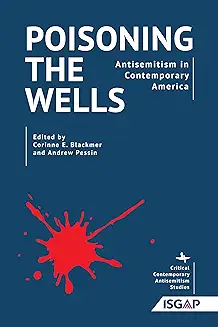In twenty-first century America, antisemitism is on the rise, especially on the extreme left, the radical right, and within political Islamism. Expressions of this oldest hatred are also increasingly prevalent in popular culture, where they are spread by politicians, entertainers and celebrities, the media, social justice activists, and religious leaders, as well as in universities, in schools, on the streets, and even, in some instances, by Jews. Once, Jews regarded the United States as die Goldene Medina–the Golden Land–where they could escape persecution and finally be free. However, this dream has not been realized and major trends are moving in the opposite direction. In Poisoning the Wells, leading scholars analyze contemporary antisemitism in the United States.
Corinne E. Blackmer is Professor of English and Director of Judaic Studies at Southern Connecticut State University. She has authored numerous works, including Queering Anti-Zionism: Academic Freedom, LGBTQ Intellectuals, Israel/Palestine Campus Activism. She is currently working on a memoir of her grandmother, My Grandmother as an Abortionist before Roe.
Andrew Pessin is Professor of Philosophy at Connecticut College and Campus Bureau Editor at the Algemeiner. He is author or editor of (among others) Anti-Zionism on Campus and The Jewish God Question as well as of three novels, his most recent being Nevergreen, a satirical account of campus cancel culture and its deleterious impact on the Jews. More information about him and his work may be found at www.andrewpessin.com.
Dr. Charles Asher Small is the book series editor.
ISGAP-Academic Studies Press (ASP) Critical Contemporary Antisemitism Studies is an interdisciplinary ISGAP book series that explores the context of studies of contemporary antisemitism as it relates to otherness and belonging in the age of neoliberal globalisation. The book series examines notions of contemporary antisemitism, including the demonisation of Jewish peoplehood and different forms of discrimination and marginality in the context of historical and contemporary forms of antisemitism, racism(s), ethnicity, religion and religious pluralism, and gendered identities. The book series aims to explore the intersectional composition of antisemitism and marginality and to examine how these phenomena operate globally across societies and institutions.


